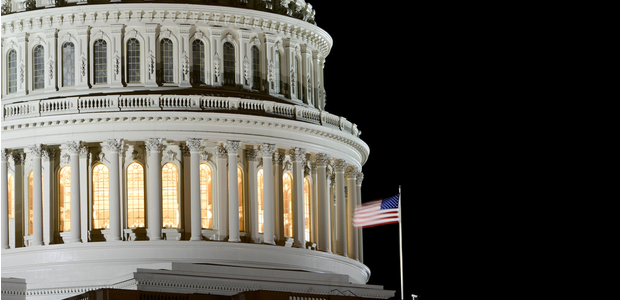House releases must-pass spending bill two days ahead of shutdown
Six months into fiscal year 2018, with about 48 hours left on the current continuing resolution, Congress appears poised to pass an appropriations package.

The House Appropriations Committee released a must-past $1.3 trillion spending bill on the evening of March 21, barely two days ahead of a possible government shutdown.
The bill weighs in at almost 2,300 pages and includes hundreds of pages more in accompanying explanatory reports. It includes $700 billion in defense funding (including $71 billion in overseas contingency operations funds) and $600 billion for non-defense activities.
The bill is the product of weeks of negotiations between Republicans and Democrats in both chambers of Congress. It contains funding for key priorities of both parties, as well as compromises or outright punts on matters where agreement couldn't be found. It comes six months into the current fiscal year and after five continuing resolutions.
"Through hard work, long days, and a dose of bipartisanship, we were able to reach an agreement to keep the government of the American people open for business," said Sen. Pat Leahy (D-Vt.), the vice chairman of the Senate Appropriations Committee.
From the federal IT perspective, the Technology Modernization Fund will get $100 million. That's short of the $228 million called for in a previous appropriation, but with just six months left in the fiscal year, the amount may not represent such a drastic reduction over what was sought.
The omnibus also includes $782 million to fund the electronic health records modernization program at the Department of Veterans Affairs. This funding will allow the VA to sign a long-awaited contract with Cerner and begin work on implementation of a commercial electronic health record. VA had put in a request to reprogram money from existing accounts under previous continuing resolutions in order to get the deal out the door in calendar 2017. But that plan was scuttled in part because VA Secretary David Shulkin wanted additional time to work on how the new system would be interoperable with other commercial systems.
Recent cloud computing acquisition activities at the Department of Defense, which could lead to a multibillion single award to a cloud infrastructure provider, also have attracted notice of lawmakers. The legislative report on the defense spending portion of the omnibus notes that "there are concerns about the proposed duration of a single contract, questions about the best value for the taxpayer, and how to ensure the highest security is maintained."
Lawmakers are calling for two reports from the Pentagon on cloud computing.
One is tasked with detailing a DOD-wide cloud strategy covering all entities that also includes a justification for going with a single CSP, "rather than creating an infrastructure capable of storing and sharing data across multiple cloud computing service providers concurrently, to include data migration and middleware costs."
The second report, due within 45 days of the enactment of the appropriations bill, covers an ongoing procurement by the Pentagon cloud steering group dubbed Joint Enterprise Defense Infrastructure, or JEDI. That report includes 2018 and 2019 budget requests, overall cloud budgets and justifications for acquisitions involving "other transaction authorities."
Elsewhere in the omnibus, the Internal Revenue Service landed $350 million in new funding for customer service, including improving phone response times and to combat fraud and promote cybersecurity.
Voting cybersecurity also got some attention, with $380 million going to the Election Assistance Commission to provide grants to states to upgrade election systems and "combat outside interference in U.S. elections."
A measure that applies Federal IT Acquisition Reform Act-style CIO authorities to the top tech official at the Federal Communications Commission made the cut.
The bill also includes the Cloud Act, a bill designed to normalize varying rules governing law enforcement access to remotely stored communications, and to give law enforcement a way of obtaining records from U.S. companies, even if those records are stored abroad.






